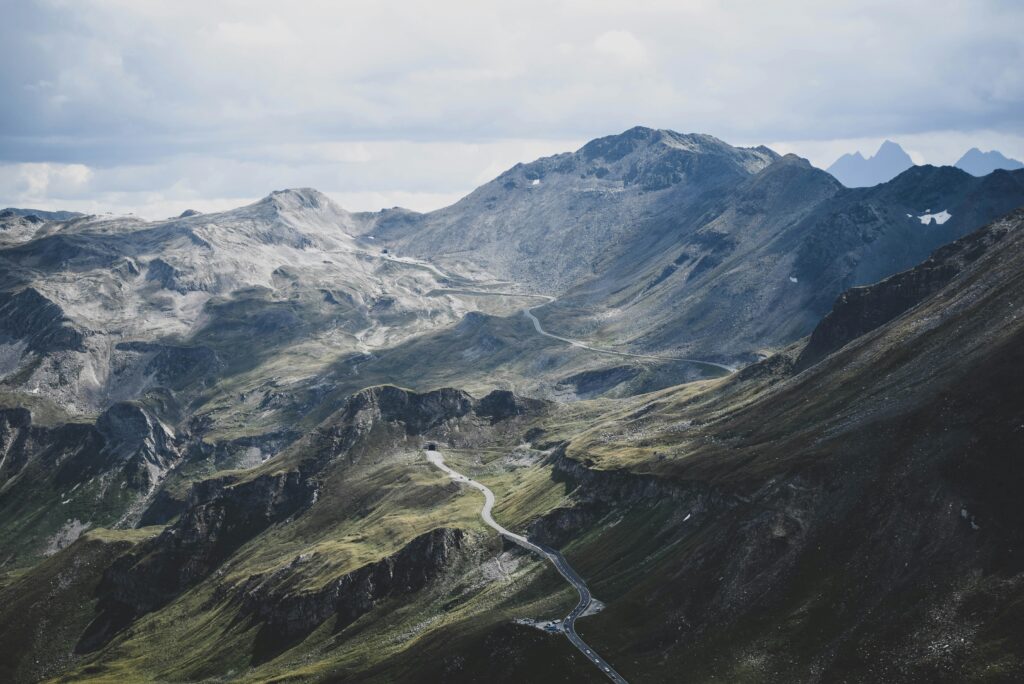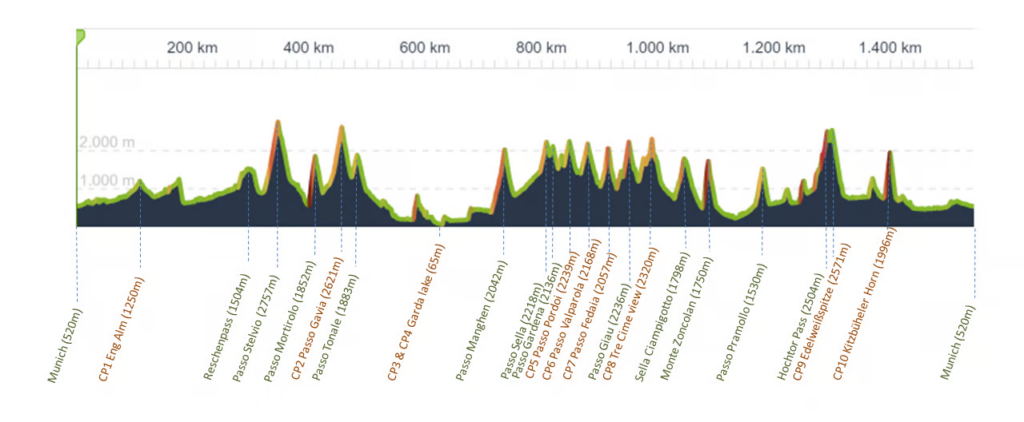“Dear Bernd, we are excited to inform you that you have secured a slot for the Monaco di Baviera Classic Ultracycling Challenge 2025!”
Oh yeah! This year, I will be taking part in the Monaco di Bavaria Classic – an ultracycling event with 1500 km and over 30,000 meters of elevation gain – in the Alps and the Dolomites! At first, it may sound scary for me. But after I have already completed 1500 kilometres with around 25,000 metres of altitude on the Alpi4000, the fear is a little bit reduced 😉
The Monaco di Bavaria Classic is one of the truly challenging ultracycling events – a real adventure for anyone willing to push their limits. With a route of over 1500 kilometers and 20 passes through the majestic Alps, this event tests not only participants’ endurance but also their mental strength. And that’s precisely what excites me. I love the mountains, the Alps, the Dolomites and I always feel the deep urge to reach the highest point of a road.
The Monaco di Bavaria Classic 2025 crosses some of the most famous passes and breathtaking locations in Bavaria, Austria, and northern Italy. Steep climbs and stunning alpine landscapes are the hallmarks of this ultracycling event. But it’s not just about the route – it’s the idea of total self-supporting that makes the Monaco di Bavaria Classic such an appealing experience for me. No support – every rider is on their own, responsible for self-supporting and design their own strategy to reach the finish line in Munich.

Preparation is the key to success! – but how do you prepare for such a monstrous ultracycling challenge?
How do you get ready for an event like the Monaco di Bavaria Classic, where you’ll conquer over 1500 kilometers and more than 30,000 meters of elevation in the Alps & Dolomites? This ultracycling challenge tests not just your body but your mind as well. As an long distance cyclist and endurance athlete, I know that success demands more than just a great bike and the right gear – it’s about preparing both your body and your mind for the journey, building mental toughness, and developing the strategies you’ll need to complete the course.
The Passes:

Reschen Pass (1504m), Passo Stelvio (2757m), Passo Mortirolo (1852m), Passo Gavia (2621m), Passo Tonale (1883m), Passo Manghen (2042m), Passo Sella (2218m), Passo Gardena (2136m), Passo Pordoi (2239m), Passo Valparola (2168m), Passo Fedaia (2057m), Passo Giau (2236m), Sella Ciampigotto (1798m), Monte Zoncolan (1750m), Passo Pramollo (1530m), Hochtor Pass (2504m), Edelweißspitze (2571m), and Kitzbüheler Horn (1996m).
For me, this is the ultimate ultracycling challenge. An event that promises to be both a physical and mental adventure and offers the chance to experience the Alps in all their glory. But to truly succeed, I need to prepare intensively. Here are my first thoughts on the preparation for this ultracycling event. Until the launch on 21 June 2025, I will go into the individual points in detail and articles will follow.
1. Ultracycling Training: Kilometers and Elevation
The most critical part of preparation is, of course, cycling. To get ready for the Monaco di Bavaria Classic, it’s essential to further enhance both endurance and climbing capabilities. Fortunately, I’m still in the Philippines, where there’s no real winter break, and the terrain is mostly hilly – often extremely steep. These conditions are perfect for ultracycling training right now.
- Long rides: This is something I regularly do, often under extreme conditions. I’ll focus on long-distance rides that emphasize endurance and adaptation to challenging situations.
- Climbing training: Since the event includes demanding alpine passes, spending ample time on climbs is a must. The event includes demanding alpine passes, spending a lot of time on climbs is a must. The challenge isn’t just the ride’s length but also the gradients and unpredictable weather.
- Elevation gain: I prefer routes with a big difference in altitude. Cycling on steep climbs will help me prepare for the alpine sections of the event. I think the Fichtelgebirge is a great training area for this!
2. Nutrition and Hydration: Fueling the Engine for Ultracycling
Proper nutrition is another important factor in maintaining the energy needed for such an event.
- Preparation: I’m focusing on a balanced diet that includes both easily digestible foods and long-lasting energy sources. In the weeks leading up to the event, I’ll prioritize a carbohydrate-rich diet to fill my glycogen stores. I’m even considering seeking professional advice for the first time.
- On-the-go fueling: Self-sufficiency is a must at the Monaco di Bavaria Classic. I’m not a fan of gels and bars, I’ll stick to “real” food, as I usually do on long rides. I’ll also carry salty snacks and nuts to maintain my electrolyte balance.
- Hydration: Regular hydration is important for a long-distance event like this. I will keep myself hydrated with electrolytes, especially during the long climbs.
3. Equipment: My Setup for this Ultracycling Adventure
Choosing the right equipment is key to success.
- Bike: I plan to use my gravel bike for this event because its comfortable and versatility. Tire choice will be important; I’ll use durable tires that perform well on various surfaces. I’m also thinking about trying tubeless tires again before the event in 2025. But this is still a work in progress.
- Clothing: Alpine weather can be unpredictable, so layering is essential. A good set of windproof and waterproof gear will protect me from the often cold, rainy conditions. Since I plan to ride through the night, it might get quite uncomfortable.
- Gadgets and accessories: The event provides a GPS tracker. For power supply, I’ll rely on power banks and plan to test a hub dynamo from DT Swiss for my Swiss Side Wheels. Spare parts like tubes and essential small items will also be well-packed.
4. Mental Preparation: Staying Focused
The event will be as much a mental challenge as a physical one. To stay focused, I’m working on my mental strength:
- Visualization: I imagine myself navigating the route’s challenging sections, recovering from tough moments. Imaging the moments awaiting me at the end keeps me motivated. Mental techniques help me during i feel sleepy and feel pain.
- Setting goals: My goal isn’t just to complete the route but also to focused each planned segment and enjoy the road, the nature, the silence, the uphills, the alps, not just endure it.
5. Logistics and Planning: Starting Prepared
Organisation is another important aspect of preparation. I take care of all the important details, including travel arrangements, petrol stations and event logistics. Past experience and familiarity help me to decide what I need and what can be sourced locally.
6. Final Thoughts to Ultracycling
The Monaco di Bavaria Classic is a huge ultracycling challenge but also an opportunity to test myself again and grow. I’m excited to participate, knowing it will be an extraordinary experience, both physically and mentally. What I’ve learned from past events is that preparation can be the key to success, but flexibility and perseverance are just as important.
I’ll keep you updated on my blog during the preparations and the event itself – stay tuned!


